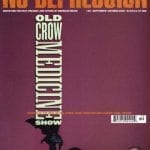Blood Meridian – Up From the Mountain
Blood Meridian singer Matthew Camirand has probably told the story a hundred times, but that doesn’t make it any less entertaining.
When not singing and playing guitar in Blood Meridian, the easygoing musician serves as the bassist in Black Mountain, a much-hyped Vancouver collective specializing in bong-blasted indie-rock. Last year, Black Mountain somewhat improbably landed the opening slot on Coldplay’s summer tour.
Things went fine for the first couple of dates in Eastern Canada, then fell apart when it came time to cross the border into the United States. On the morning of August 4, 2005, Black Mountain’s singer was hauled aside by U.S. Customs officials, who discovered he didn’t have the proper paperwork to get him into America.
Camirand and the rest of the band continued on to the venue in Hartford, Connecticut. With Black Mountain unable to perform, Camirand offered to play solo as Blood Meridian, which had released its debut disc, We Almost Made It Home, in late 2004.
“I got in touch with Coldplay’s people, and they were like, ‘Great,'” Camirand recalls. “We got to the venue late, so I grabbed my guitar, ran through the crowd, found the security, and they took me to the stage. I ran by [Coldplay singer] Chris Martin, who was playing ping-pong, and he was like, ‘Hey — you’re in the opening band.’ I had to go, ‘Um, I’d love to meet you right now but I’m supposed to be onstage.’ Then I played to like 22,000 people. It was so cool.”
While Camirand is still best-known for Black Mountain, look for that to change with Blood Meridian’s sophomore album, Kick Up The Dust, released on V2 Records in August. Where the band’s debut disc drifted quietly from song to song, Kick Up The Dust finds the singer ready to fuck, fight, and drink, though not necessarily all the time or in that order.
Variety is the big selling point here, with Camirand proving himself equally adept at midnight murder ballads (“In The Forest, Under The Moon”), desert-scorched epics (“Good Lover”) and bourbon-drenched sing-alongs (the title track). He has no problem busting boundaries — the hymnal “Most Days” sounds like Prince embracing his inner cowboy — but he’s just as capable of playing it straight with back-porch beauties such as “Try For You”.
Markedly different from what it has evolved into today, Blood Meridian started out as a bedroom project when Camirand was playing bass with Vancouver glam-trash punks the Black Halos. Written partly on the road with the Halos, We Almost Made It Home found the Ottawa-raised musician getting personal as he chronicled everything from his fear of spending hours in the rolling “silver-bullet metal coffin” known as a tour van to the depression caused by his day job as a health worker with Vancouver drug addicts. Reflecting the often-bleak lyrics, the album’s songs were a downbeat blend of narcoticized folk, slate-grey Americana, and dark-hearted indie-rock.
When it came time to record Kick Up The Dust, Camirand was in a decidedly better place. Accompanied by his bandmates — guitarist Jeff Lee, organist Shira Blustein, bassist Kevin Grant, and drummer Joshua Wells — the singer decamped to rural Shawnigan Lake on Vancouver Island.
“Our friend Dante DeCaro, who used to play guitar in Hot Hot Heat, lives out there, as does his mom, and she’s got an old barn that’s been turned into a rudimentary studio,” he explains. “We rented a little house on the lake, spent about twelve to fourteen hours a day recording, and would then go swimming in the rock quarry down the road.
“The room had a certain vibe, and that totally dictated the sound of the record. I listen to the record now and I hear the cottage, the barn, and the horses that were outside next door.”
As on Blood Meridian’s debut, Camirand doesn’t hesitate to throw himself into the songs. The shuffling jangle-rocker “Your Boyfriend’s Blues” finds him flipping the script on the standard cheating song: “Girl I know you got a man, and I know he wants me dead/Well you may be in his arms today, but tonight you’ll be in my bed.”
“There are so many songs out there about how someone stole your girlfriend,” the singer says. “I decided to write a song for the thief.”
Elsewhere, his personal narratives are more noble of intention. The organ-drenched country-rocker “Work Hard, For What?” finds him praising his mom for supporting his decision to play music, after which he goes on to lament, “I know in my heart that I’ll never be rich.”
“My parents have never told me that doing this isn’t going to get me anywhere and that I should go back to school and get a real job,” he says. “That means a lot to me.”
Compensating for the lack of riches are the little victories. Like, for example, walking out alone in front of a stadium full of Coldplay fans and living to tell the tale.
“It’s a crazy thing to sit in front of 22,000 people and hear your voice amplified that loud,” he says. “People are always like, ‘Weren’t you nervous?’ I wasn’t until I finished, but as soon as I got offstage, my knees wouldn’t stop shaking from the adrenaline. It’s like, who gets to do that? There’s a billion bands that would kill to open for Coldplay, and not one of them gets to go up there and do it solo.”




